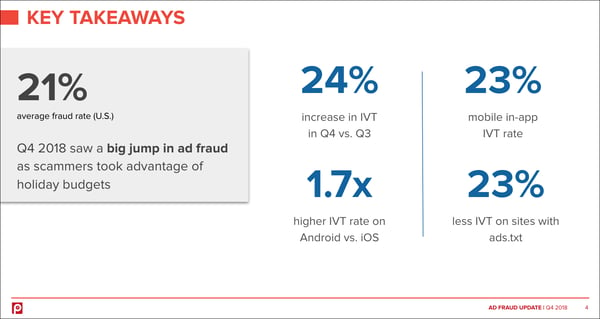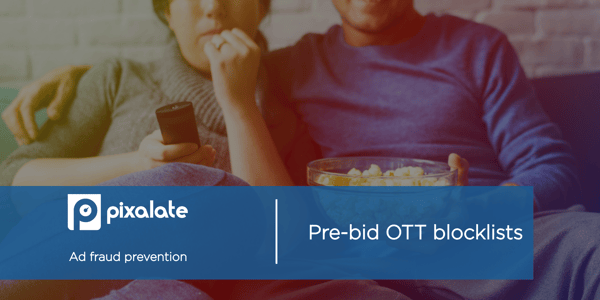
This week's review of ad fraud and quality in the digital advertising space.

Pixalate has released the Q4 2018 Ad Fraud Report, a comprehensive analysis of programmatic traffic quality and the state of invalid traffic (IVT) across desktop, mobile web, and mobile in-app advertising.

The rise in CTV/OTT programmatic advertising has attracted fraudsters, however, and these scammers have been flying under the radar due to some common myths about ad fraud in OTT. Pixalate, the leading anti-fraud solution for OTT advertisers, has closely studied invalid traffic behavior in OTT to develop best-in-class products to protect your growing investments.
Learn more about how Pixalate exclusively prevents ad fraud in CTV/OTT with two pre-bid blocklists:
.jpg?width=600&name=Display-Android-tablet-top-apps-USA-(Q4-2018).jpg)
Pixalate highlights the top 10 trending Android tablet apps in the United States, based on display and video programmatic advertising volume, in Q4 2018. Games accounted for over half of the top 10 apps in both display and video advertising.
See more of the trending Android tablet apps.
AdExchanger goes "inside the agency turf war over Connected TV," noting that TV buyers currently have an advantage over digital video buyers. However, AdExchanger also notes that "the complexities of CTV require a digital background," writing, "Digital buyers also know how to work across walled gardens and stitch together disparate data. CTV measurement today is nascent and comes from multiple sources ... Hulu works with 20 different measurement providers, for example."

"Requiring someone to uncheck a pre-ticked box doesn't count as valid cookie consent under EU law, the adviser to the bloc's top court has said," reported The Register. The article noted that the "[a]dvocate general Maciej Szpunar's opinions aren't binding but are often followed by the Court of Justice of the European Union (CJEU). This much-anticipated confirmation of the situation came in a German case about an online lottery [which] centres on two checkboxes that confronted would-be players."
*By entering your email address and clicking Subscribe, you are agreeing to our Terms of Use and Privacy Policy.
These Stories on Weekly Recaps
*By entering your email address and clicking Subscribe, you are agreeing to our Terms of Use and Privacy Policy.

Disclaimer: The content of this page reflects Pixalate’s opinions with respect to the factors that Pixalate believes can be useful to the digital media industry. Any proprietary data shared is grounded in Pixalate’s proprietary technology and analytics, which Pixalate is continuously evaluating and updating. Any references to outside sources should not be construed as endorsements. Pixalate’s opinions are just that - opinion, not facts or guarantees.
Per the MRC, “'Fraud' is not intended to represent fraud as defined in various laws, statutes and ordinances or as conventionally used in U.S. Court or other legal proceedings, but rather a custom definition strictly for advertising measurement purposes. Also per the MRC, “‘Invalid Traffic’ is defined generally as traffic that does not meet certain ad serving quality or completeness criteria, or otherwise does not represent legitimate ad traffic that should be included in measurement counts. Among the reasons why ad traffic may be deemed invalid is it is a result of non-human traffic (spiders, bots, etc.), or activity designed to produce fraudulent traffic.”

